In the ever-changing world of WordPress development, choosing the right framework is essential for ease of content management, scalability, and customization. The Pods Framework and Advanced Custom Fields (ACF), two well-liked systems, are contrasted in this paper. While Pods extends WordPress with custom post types, taxonomy, and connections, ACF improves WordPress by introducing custom fields, which makes it perfect for structured content. To assist you in selecting the best solution for your project, we will examine important factors like performance, community support, use cases, flexibility, ease of use, and integration possibilities.
Key Summary :
- Performance: Pods are faster with custom database tables, while ACF relies on Postmeta table which slows down the large sites.
- Scalability: Pods handle large, complex sites better while ACF is ideal for small to medium sites.
- Ease of Use: ACF is User-friendly and quick to set up, while Pods has a learning curve but saves time with built-in features.
- SEO: Pods support pre-rendered content for better SEO, while ACF requires extra effort for optimizations.
- Cost: ACF is the free version with Pro upgrade, while Pods is completely free.
- Best Use cases: ACF is great for blogs and business sites, while Pods is better for directories, memberships and complex data structures.
👉Read the full Blog to choose the best framework for your needs.
- Overview / Introduction
ACF (Advanced Custom Fields):
- ACF, which was developed by Eliot Condon in 2011, rose to prominence as the most popular solution for WordPress custom field management. It then expanded under Delicious Brains and joined WP Engine for ongoing development.
- Custom fields are added to posts, pages, and custom post types by this WordPress plugin, which improves content management. It eliminates the need for custom coding and streamlines structured data entry.
Pods Framework:
- Pods, a fully open-source meta fields plugin that was introduced in 2008 and is maintained by the Pods foundation and community, was developed under the direction of Scott Kingsley Clark.
- A strong WordPress plugin that lets you make and control unique post types, taxonomies, and complicated connections between content types, which makes it perfect for large data sets.
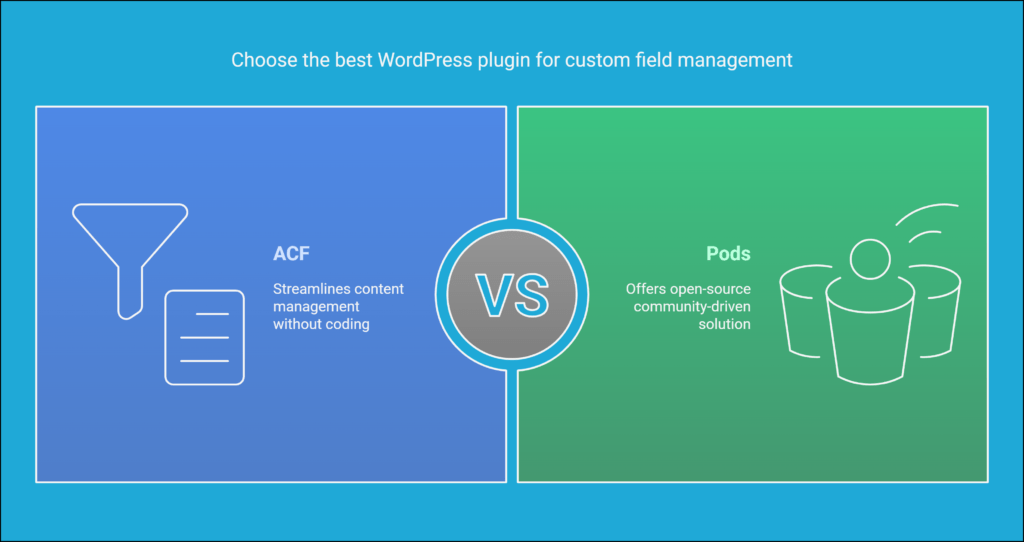
- Why We Must Compare
We must compare ACF and Pods Framework because there are many reasons to Understand majorly are given below:
- Performance: The tool you choose will determine how fast your page will load, affecting both user experience and SEO.
- Scalability: The appropriate framework aids growth.
- Developer Time: Easier content management saves developers time.
- Use case: For different purposes we required different solutions.
- Cost: In everything cost plays a major role in how costly it is, and which one is cheaper.
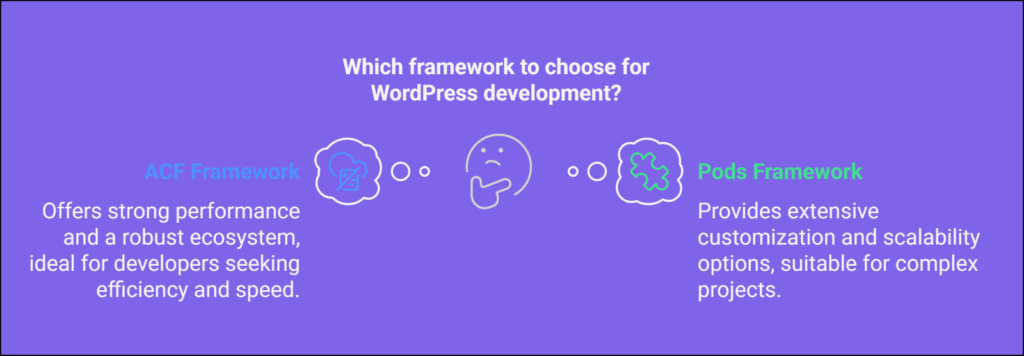
- Scalability
If you want your project to grow without facing bugs, scalability has to be there in any framework. Frameworks that can be scaled very well offer smooth user experience, faster loading times, and ease of maintenance when content, traffic, and complexity of data is growing. This is key to thriving over time and adjusting to ever-evolving online landscapes.
- ACF(Advanced Custom Fields): It best to add custom fields to existing post types, it is good for structured content as content scales with more fields. Unfortunately, it is based on WordPress Postmeta, resulting in performance issues when dealing with larger amounts of data.
- Pods Framework: It is scalable in nature, design to work on custom post types, taxonomies, and relationships, better suited to deal with complex data structures. It provides optimized database tables, an effective way of lighten the query load and resulting in smoother performance as the site expands.
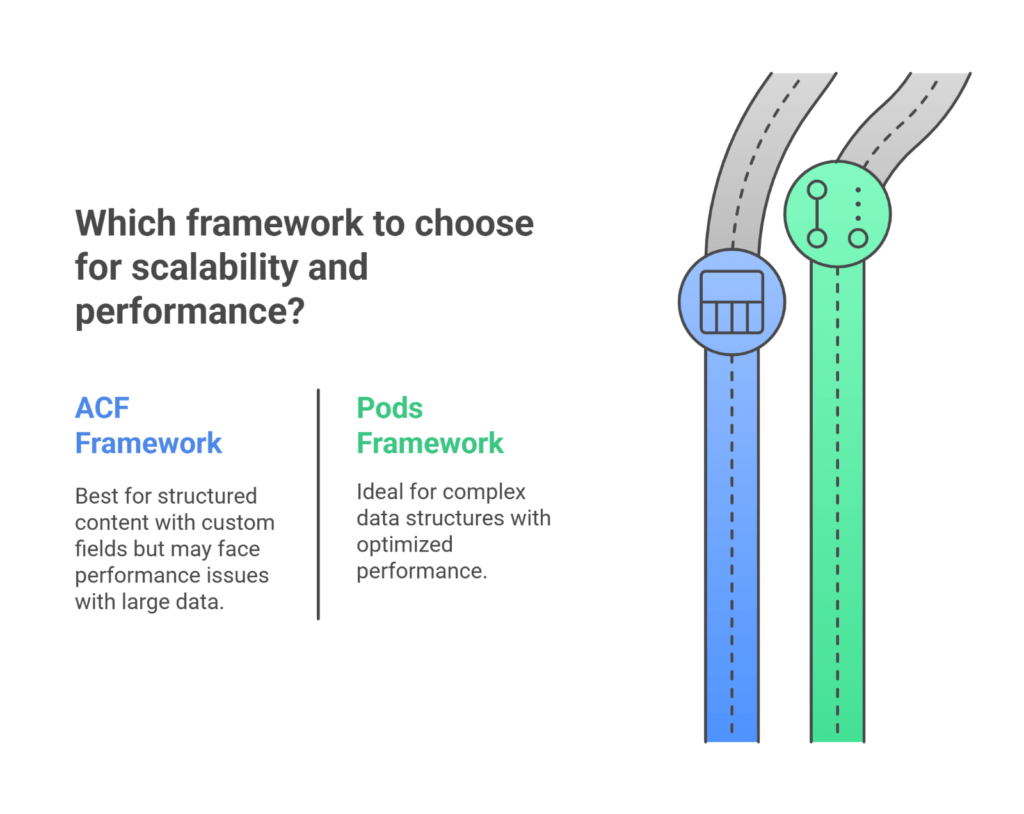
- Reusability and Modularity
ACF offers flexible field groups that can be applied across multiple post types, which significantly enhances the reusability of data. while Pods creates modularity by allowing you to create reusable custom post types, taxonomies and fields making it scalable development as it all focuses around content types and relationships.
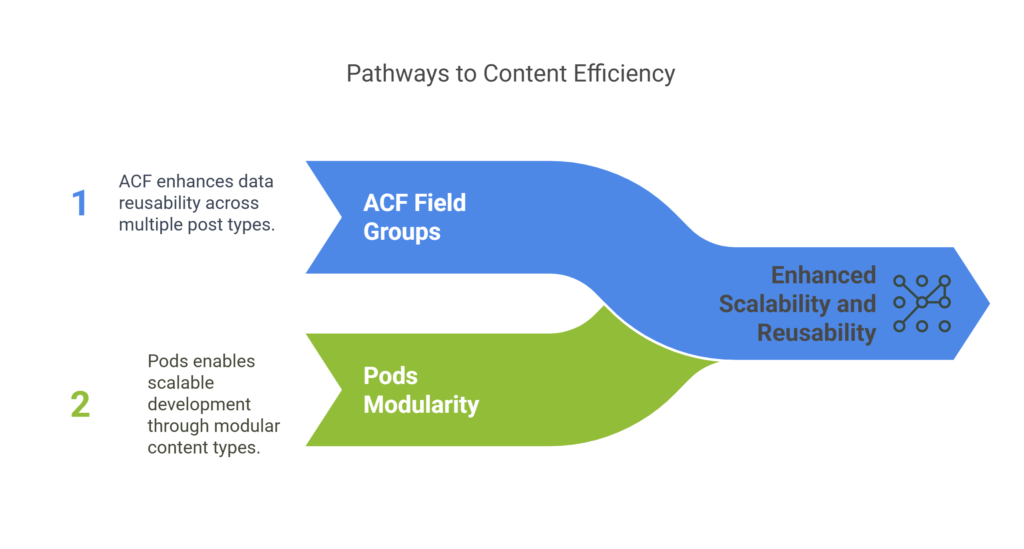
- Performance
A good framework needs to be performant as it means faster load times, smoother experience, and efficiency in resource management. A good framework with excellent SEO, scalability, and overall site reliability reinforces the success of websites as the right foundation.
- ACF Framework: As ACF relies on client-side processing may lead to slower initial load times. This also causes an SEO willfully as it might be difficult for search engines to index the dynamically generated content. Towards Data Science Developers must use caching, pre-rendering and several techniques to boost performance.
- Pods framework: Pods has quicker load times with pre-rendering and server-side assistance, providing quicker responses. It is SEO-friendly because it provides fully rendered content that can be crawled easily by search engines. It also has inbuilt performance optimization, and code spliting for improved efficiency.
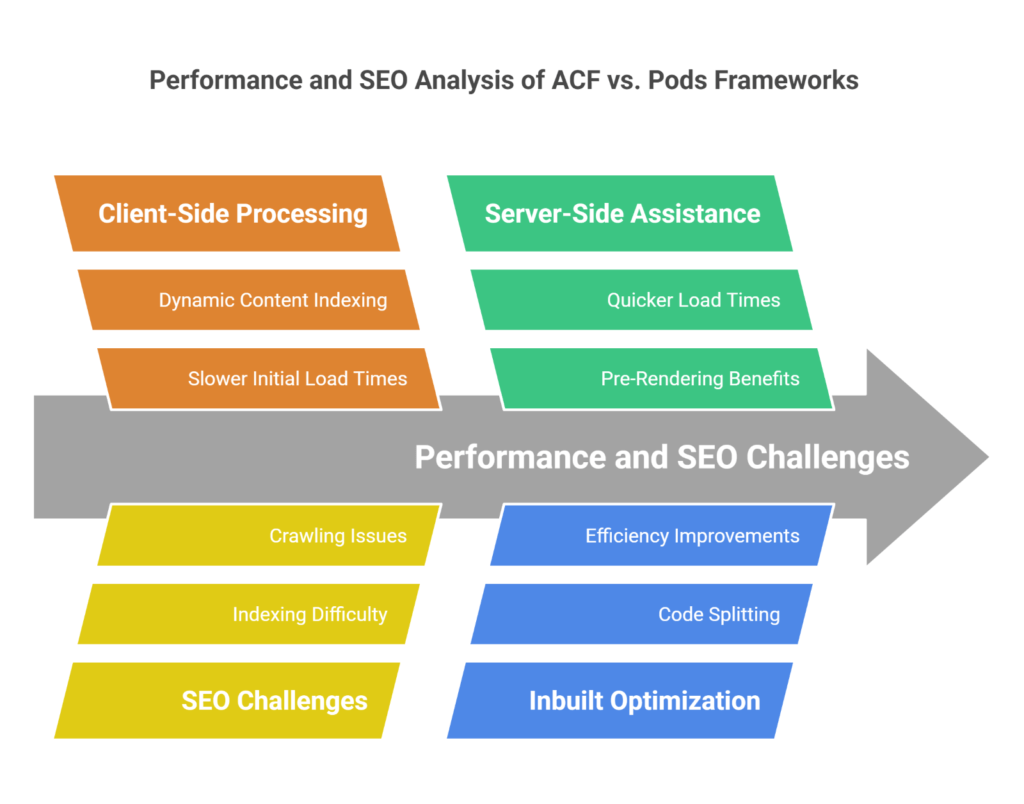
- Development Time and Ease of use
As any framework we use Development time and ease of use is necessary as it affect productivity and efficiency of project. A user-friendly Framework with built-in features removes the burden of coding and accelerates the development, preventing bugs. This helps developers to concentrate on creating the best sites instead of dealing with problems and complex setup.
- ACF Framework: In ACF it is easy to add custom fields to make setup easy and quick. However, In ACF advanced functionality comes with price for extra plugins. As the project grows, managing Custom fields structures and relationships became an issue, which needs extra effort for scalability.
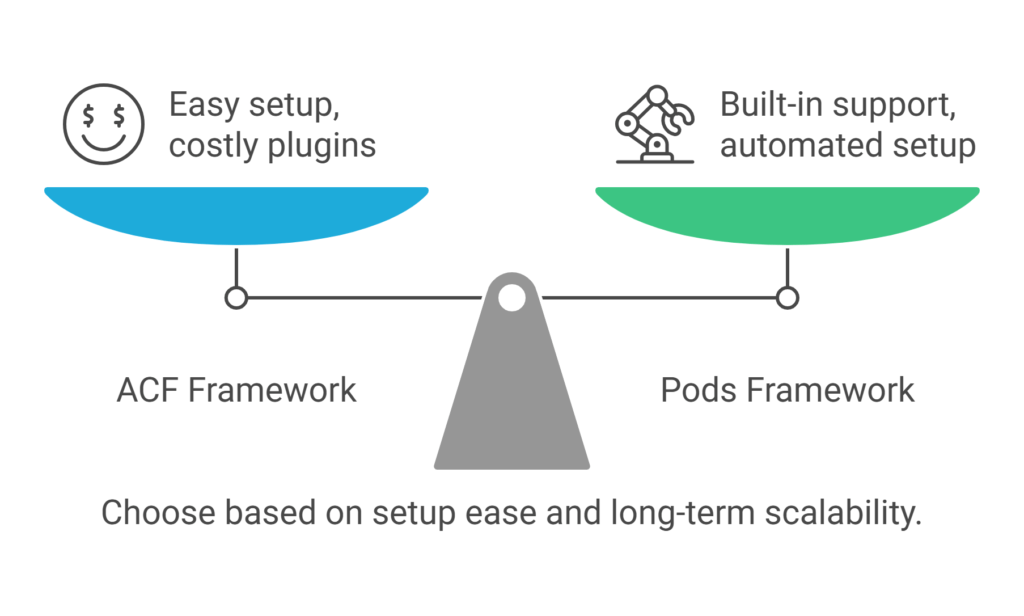
- Pods Framework: Pods have built-in support for custom post types, teleonomies and relationships which accelerate the development. It cut out the need for extra plugins with a clean interface and automated setup for easy installation and faster development.
- Community and Ecosystem
A robust ecosystem and community are necessary to any WordPress framework since they provide ongoing support, frequent updates, and a rich array of plugins and extensions. A big community enables real-time troubleshooting, best practices, and a high knowledge base, hence easier development.
- ACF Framework: It is well established and well used framework with a large community and complete documentation. It is highly customizable through their supports of many themes and plugins, For additional Functionality we need coding. While third-party add-ons provide functionality, choosing the appropriate combination becomes overwhelming for beginners.
- Pods Framework: Pods framework is fast growing platform with a healthy ecosystem and not many documentations available. As Pods framework is an open-source framework without subscription we can make use of Pods framework. Due to its open-source network and managed by the organization it has very little community to handle your queries fastly.
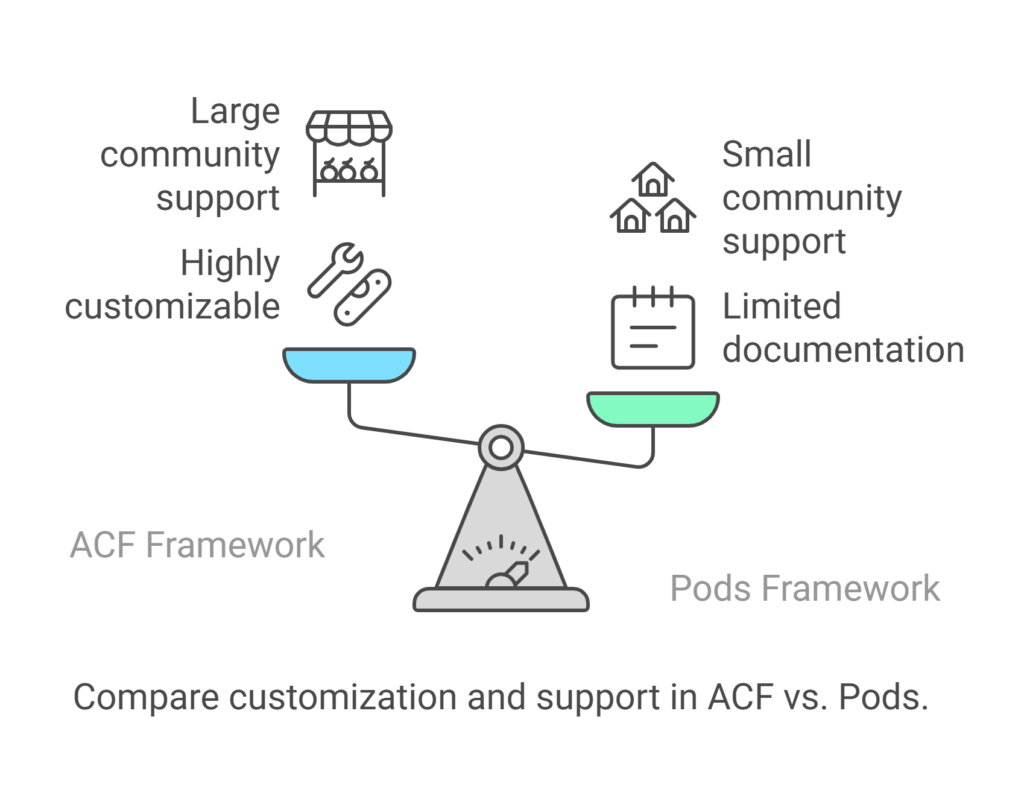
- Use case and Long-Term Viability
The use case of any framework in WordPress determines how well it fits with different project needs, from simple content management to complex data structures. The right framework ensures efficient development and scalability. Long-term viability is crucial as it guarantees ongoing updates, security patches, and community support, preventing future compatibility issues and keeping the site running as technology evolves.
- ACF Framework: It is ideal for content-rich websites like business sites and blogs that need custom fields. As ACF supports premade themes, which is ideal for designers and quick customization without heavy coding.
- Pods Framework: Pods framework is best suited for custom post types, taxonomies and relationships. It’s best for developer side focused process sites and needs fewer plugins.
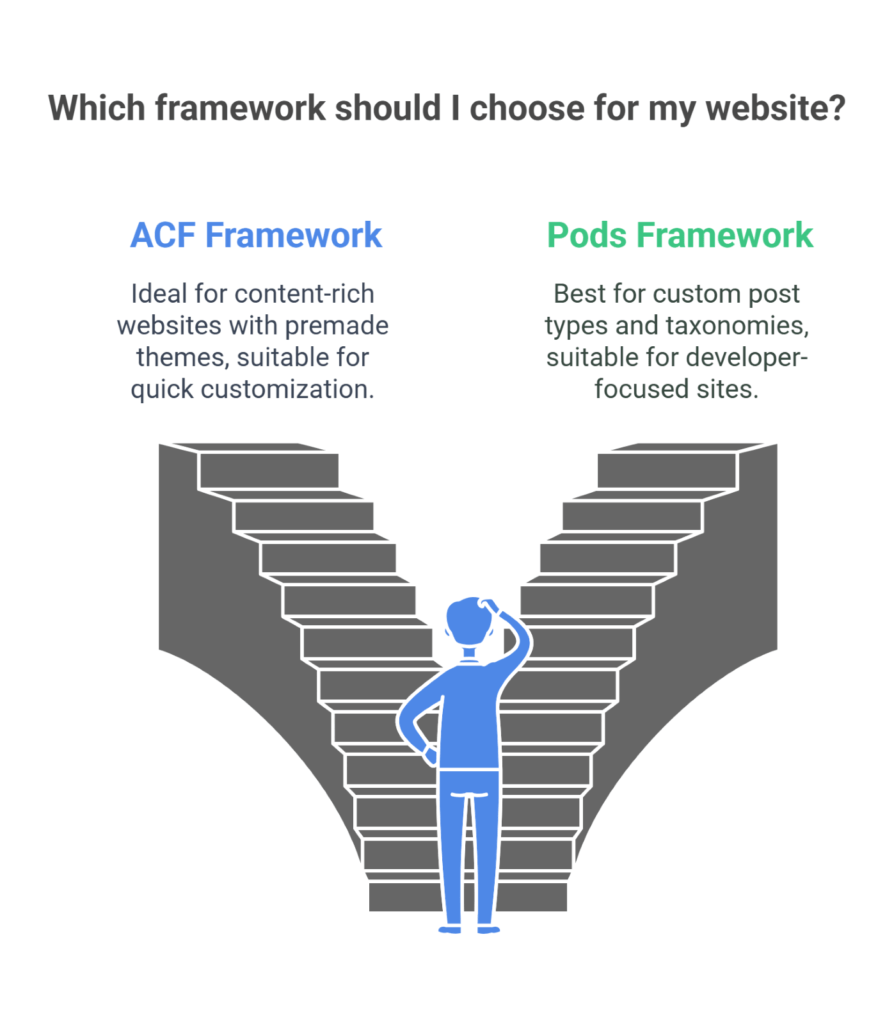
- Cost
In every factor cost plays a major role we to choose very brightly when there is cost things come to play. In the development of any project, we must decide which framework we have to choose, and which framework increases our cost in project development. In WordPress Majorly used Framework for custom fields are ACF framework and Pods framework. Let’s here explain which framework we must choose according to project needs and requirements.
- ACF Framework: ACF framework is both Free and pro version For user. In free Version ACF provides 30 different types of custom fields while in pro version it provides advanced custom fields, like maps, multiple relationship , ACF blocks with PHP and flexible content fields. ACF charges $49 per year for one website , $ 149 per year for 3 websites and $249 per year for unlimited website for hosting and managing websites.
- Pods Framework: Pods Framework is open-source platform managed by organization and have small community to answer your queries it not charging any fees for using custom post types, relationship, and Custom blocks. While Pods framework provide 25 + different custom Fields types. Additionally we can add third party plugins for advanced custom fields it’s charging minimal fees of $79 per year for 1 website updates and support and $179 per year for unlimited website updates and support for one year.
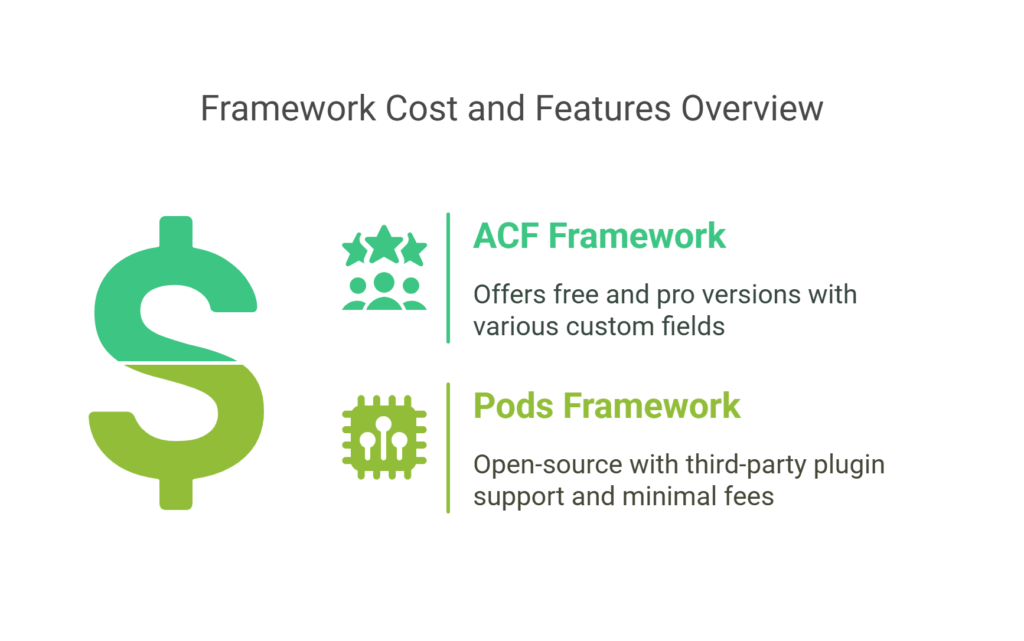
10. Differences
| Initial Release | 2011 | 2008 |
| Purpose | Adds custom fields to existing post types | Creates custom post types, taxonomies, and relationships |
| Ease of Use | User-friendly interface, ideal for quick setup | Requires more configuration but offers deeper control |
| Customization | Requires additional coding for complex structures | Built-in support for advanced content types and relationships |
| Scalability | Best for small to medium projects | More scalable for large, complex data structures |
| Performance | May require optimization for speed | Optimized with built-in caching and better database handling |
| SEO Friendliness | Content is stored as meta fields, requiring extra work for SEO | Content is structured, making it more search engine friendly |
| Extensibility | Large third-party plugin ecosystem | More self-contained but extensible through hooks and filters |
| Community Support | Large and well-established community | Smaller but dedicated open-source community |
| Cost | Free version with premium add-ons | Completely free and open-source |
| Best Use Cases | Blogs, business websites, and theme-based development | Directories, membership sites, and complex WordPress applications |
11. Conclusion
Choosing between Advanced Custom Fields (ACF) and Pods Framework depends on project needs, scalability and cost considerations.
- ACF is best for content-dense sites that need structured data to be handled easily. It boasts enormous community support but can be prone to application-scale problems owing to WordPress postmeta reliance. Advanced features being available in the pro version comes at a cost.
- Pods Framework is best suited for complex data relationships with custom taxonomies, post types, and database tables for enhanced scalability and performance. Since it is an open-source plugin, it is inexpensive but with fewer resources and community.
For small projects, ACF has easy and fast setup, whereas for scalable and performance-critical applications, Pods has greater long-term sustainability. The decision is ultimately based on whether you value ease of use (ACF) or flexibility and scalability (Pods).
FAQs:
- What is the major difference between ACF and Pods framework?
Ans. ACF primarily enhances existing post types by adding custom fields while Pods allows you to create and manage custom post types, taxonomies and relationships.
- Which Framework is better for performance?
Ans. Pods is generally better for performance as it stores data in custom database tables, reducing WordPress’s Postmeta overhead. ACF relies on the Postmeta table, which can slow down performance in large-scale applications.
- Is ACF or Pods better for SEO?
Ans. Pods are more SEO-friendly because it supports pre-rendering and structured data relationships. ACF requires additional optimization for SEO as its content is dynamically loaded.
- Which Framework is easier for beginners?
Ans. ACF is easier for beginners because it has a simple UI and integrates well with WordPress themes. Pods have a steeper learning curve but offer more flexibility for developers.
- Does ACF and Pods require coding Knowledge?
Ans. ACF requires minimal coding for basic use but may need custom code for advanced functionality. Pods provide more built-in features, reducing the need for extra coding.
- What are the cost differences between ACF and Pods?
Ans. ACF has a free version but requires a paid Pro version for advanced features. Pods are completely free and open source, making it a cost-effective choice for complex sites.
- Can I use ACF and Pods together?
Ans. Yes, you can use both, but it’s generally better to stick to one to avoid redundancy and performances issues.
- Which one is more scalable?
Ans. Pods are more scalable because it supports custom database tables, making it better for large websites. ACF may slow down as the number of custom fields increases.
